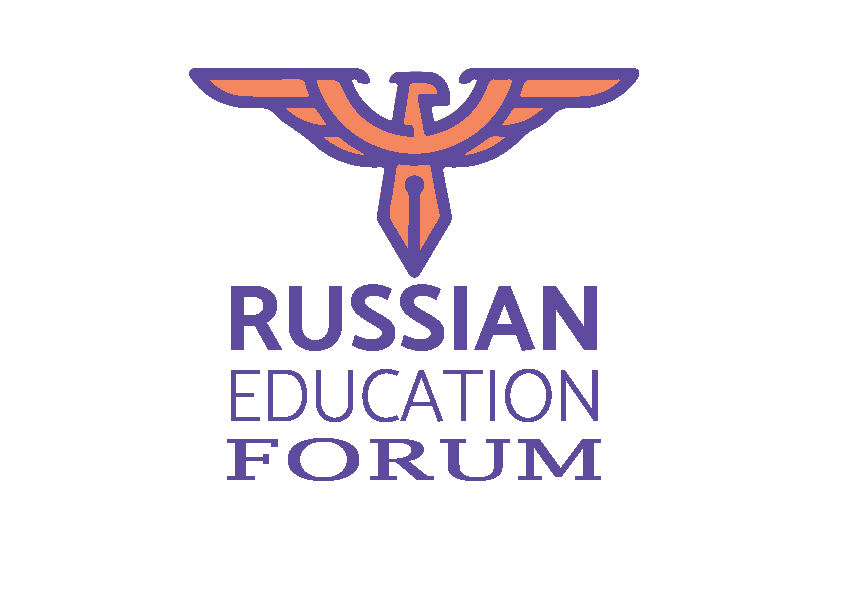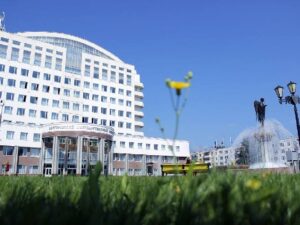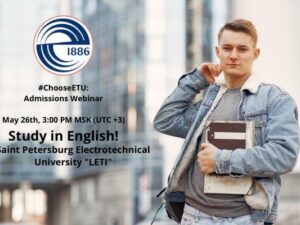Russian universities applying for participation in the federal program “Priority 2030” continue to defend their strategic development programs. At the defense, rectors talk about how universities will change and what projects will radically affect the transformation of universities.
Opened the eighth day of defense of MGIMO of the Russian Foreign Ministry– a university that trains personnel for the international representation of the country. Despite the fact that international relations remain at the forefront of the university’s development agenda, MGIMO is open to new educational trends. According to Rector Anatoly Torkunov, MGIMO’s strategy for the period up to 2030 is to train highly professional specialists for Russia and partner countries in various fields: politics, economics, law, agriculture, sports, environmental protection. Now the innovation of the educational activity of the university consists in teaching students in two programs at once. In a few years, unique specialists will enter the market. At the same time, the children will be fluent in foreign languages, which is the hallmark of the university at the international level.
Irkutsk State Transport University (IrGUPS) presented its development strategy next. Together with the university, the team was represented by a representative of the Russian Railways Corporation, the main customer of research and training. According to Alexander Zbarsky, Deputy Head of the Personnel Department of Russian Railways, today the university is ready to re-assemble and provide education in a new format.
“At the state level, much attention is paid to increasing the carrying capacity of the BAM and Transsib. IrGUPS occupies a unique place in all this because the university is located in the heart of the Eastern Polygon, where the management and implementation of innovations of the railway system are carried out. Therefore, the combination of the research interests of the university and the railway will give an impetus to the technological renewal of the industry. As a result, not only scientific research will be implemented, but also, as a result, programs of additional professional education. New technologies need to be massively taught and disseminated, ”explained Alexander Zbarsky.
Kursk region is a region with great potential in terms of innovation. It is here that scientists at Southwestern State University (SWSU) create, within the framework of scientific consortia, inventions that are in demand throughout the Russian Federation: exoskeletons, satellites, and unique IT developments. That which can transform life for the better here and now is being born on the Kursk land.
Deputy Governor of the Kursk Region Alexander Churkin notes the importance of supporting SWSU at the federal level.
“The participation of the university in the Priority 2030 program will help attract additional resources to the region. Personnel support, innovative solutions, work in a consortium – this is what is currently spelled out in the development strategy of the university and is fully consistent with the strategy of the Kursk region, ”he explained.
In the Vologda Oblast, the regional development strategy includes directions for the development of higher education and personnel policy. At the same time, Vologda State University (VOSU) is one of those flagship universities that help the region to develop and build up its potential in the form of talented youth. Deputy Governor of the Vologda Region Vitaly Tushinov notes that the geographical location of the region between the two largest agglomerations of the country increases the risk of losing young personnel.
“We are the platform where our metropolitan employers draw their personnel. For us, retaining youth is paramount. Therefore, we are creating an economic basis for young people to stay in the region, and the task of the WGU is to make it interesting for young people to study, ”says the Deputy Governor.
Rector of the Russian State University for the Humanities (RGGU) Alexander Bezborodov is convinced that higher humanitarian education needs a new impetus for the development of humanitarian security.
“RGGU is ready, at the expense of new points of growth, to form a systemic transition from traditional humanitarian knowledge to integrative humanities,” he notes.
Work on the creation of an interactive atlas of the indigenous peoples of Siberia, “smart civilization” – a country portal for all CIS countries, the formation of a digital platform for modern Russia, where new methods of data analysis will be applied – this is also a new RSUH. A special program is an international education through a network university. RSUH is already actively working in Latin America and Africa. Students from Uganda and Zimbabwe are showing great interest in the Political Leadership in Africa Master’s program.
High-speed traffic, magnetic levitation, the Arctic, and a safe transport ecosystem are all promising areas of work for Emperor Alexander I St. Petersburg State Transport University (PGUPS). The competence of the university in these matters is recognized by colleagues at the world level. Defense of the PGUPS development strategy within the framework of the Priority 2030 federal program competition is another confirmation of professional ambitions: tomorrow graduates will come to work on one of the country’s new transport arteries – the Northern Latitudinal Passage.
According to the rector Alexander Panychev, PGUPS is waiting for collaboration with other institutes and training of personnel in accordance with the new requirements of customers.
“Education will change in terms of interdisciplinarity and modularity. The presence of interdisciplinary connections allows us to provide the market with personnel who are ready to work in related industries, ”he is sure.
Vice-Governor of St. Petersburg Vladimir Knyaginin came to the defense together with the PGUPS team. He notes that a large agglomeration of the Northern capital and the Leningrad region is currently being formed.
“The agglomeration is growing at a very high rate. It is impossible to resolve the entire range of mobility issues without the participation of Russian Railways. We expect large investments in the construction of the high-speed rail. It is extremely important for us that, in addition to the “operators”, we receive Russian Railways as a customer for complex technological developments. The entry of the city into this sector through the PGUPS is justified and absolutely logical, ”commented Vladimir Knyaginin.
The prospect of Tyumen State Medical University (TyumSMU) is to become by 2030 a research university integrated into the global agenda in the field of personalized medicine. According to Rector Ivan Petrov, the university can be a regional center for attracting talents and developing technologies for preserving health, as well as implementing educational programs that are in demand not only in the Tyumen region but also on the international market.
“We expect to double the number of students by 2030 not only in those programs that are available now, including secondary vocational education, in order to completely close the cycle: secondary education, higher education, postgraduate education, master’s degree, residency, additional vocational education, ”he notes.
The subject of special research pride of Tyumen State Medical University is Chronomedicine. This project received grant support from the Government of the Tyumen Region, and world-class scientists are already working on research.
Over 85% of doctors working in the Voronezh Region are graduates of the Voronezh Medical University. It so happened historically that it is within the walls of this university that medical personnel is trained both for the Voronezh region itself and for the entire Central Black Earth region of the country. While the university prepares an average of 7 thousand future doctors, by 2030 this figure may grow to 10 thousand specialists. Scientific priority, according to the rector Igor Esaulenko, will make it possible to form not only a traditional doctor but also a research doctor who will work in scientific centers and research laboratories.
According to Igor Remorenko, the rector of the Moscow City Pedagogical University, the wording “city university” is more widespread in the world than in Russia.
“It so happened historically that in Russia universities were created as pivotal for the development of regions, while in the world the practice of the work of universities in the structure of municipalities is more widespread. But the influence of cities continues to increase: they are becoming more and more independent in terms of the cultural and socio-cultural policy. Educational policy is no exception! And in a few years we will see completely unexpected examples of cooperation between cities and universities, which will make cities more meaningful, involve a higher proportion of citizens in urban politics, ”the rector said.
By 2030, St. Petersburg State Technological University plans to implement five strategic projects that relate to petrochemistry, gas chemistry, medical biotechnology, innovative materials for the production of modern products, and low-tonnage chemistry for the production of materials in the Arctic zone. In the meantime, the university faces a big task: to involve students in science from the very first year.
“During their studies, a third of our students show their scientific potential and are ready to go further to master’s and postgraduate studies, the same number of students are focused on manufacturing and industrial enterprises, they want to realize themselves in the regions of the country,” says Rector Andrei Shevchik.
Krasnoyarsk State Medical University named after prof. V.F. Voino-Yasenetsky (KrasSMU) is preparing as part of a strategy to eliminate the imbalance and shortage of medical personnel in the health care of the region.
“Today we have a deficit of 2,000 vacancies for both primary care and narrow specialists. Thanks to the work with the regional budget, our opportunities for targeted training, and of course, the federal programs, we are able to eliminate the deficit in 4-5 years, ”rector Alexei Protopopov believes.
The development strategy of the Moscow State Regional University is a verified algorithm that allows it to stay in the trend of the educational agenda both today and in 10 years. According to the rector Elena Pevtsova, the university team held more than one strategic session before confidently answering the question: “What kind of university will we be by 2030, by the 100th anniversary of the university?” The projects announced by the university within the framework of strategic development will bring MGOU to a new level. If last year the university was able to discover thirty new directions in education, then the implementation of the tasks set is a matter of time and the successful work of the team.
Smolensk State Medical University in 2020 celebrated the 100th anniversary of its foundation. The special pride of the university is the status of the university, whose foreign graduates, in particular, from India, confirm their doctors’ diplomas at home the first time.
“We are consultants to the World Health Organization, our base hosts the only WHO center in Eastern Europe for capacity building in the field of research and development of antimicrobial resistance – antibiotic resistance,” said Rector Roman Kozlov.
According to the Prime Minister of the Republic of Adygea Gennady Mitrofanov, the work of the Adyghe State University is supported at the level of the Government of the Republic. Particular attention is paid to the mathematical projects of the university, which have an international status. In addition, university employees interact with socially significant structures and increase the level of digitalization in the constituent entity of the Russian Federation. The subject of special pride is the creation of an industrial zone in the Takhtamukaysky district of Adygea. The university retains its status as one of the best Russian mathematical schools and is preparing to make a breakthrough in IT education.
“Translated from the Adyghe“ Maikop ”means“ the valley of apples ”. We decided to create our own “apple valley” – an industrial zone with an IT campus, which will house the offices of enterprises. For this, our university must form a system of training high-quality IT specialists, ”rector Daud Mamiy shared his plans.
The largest architecture and construction university in the country – St. Petersburg State University of Architecture and Civil Engineering (SPbGASU ) is ready to develop the strategic project “Education” and attract talented youth from all over Russia to its platform. And the strategic project “Science”, aimed at preserving the architectural heritage of the country and solving the problems of the development of the Arctic zone, will make it highly qualified specialists in love with their work.
One of the most significant business teams in the country came to support Volgograd State University (VolSU) to defend a strategic project. According to Yuri Blinkov, executive director of the Volgogradsky branch of JSC Severstal Kanaty, business is interested in the university not only solving personnel issues but also actively participating in research work.
“The enterprise is a member of the engineering consortium, which was created on the basis of VolSU. We were one of the first in Russia within the consortium to start doing 3D modeling. Therefore, we will implement 3D modeling, machine vision, and a number of other projects together with the university, ”he explained.
Tambov State University Derzhavin plans to increase the share of scientific developments in the field of the agro-industrial complex and the chemical industry by 2030. Rector Vladimir Stromov is confident that the university will be able to adequately respond to strategic challenges at the regional level.
“Today the development of Derzhavin University is the development of the region, and vice versa, the development of the region is equal to the development of our university,” he stressed.
Nizhny Novgorod State Pedagogical University named after K. Minina (Minin University) is a forge of teaching staff. According to and. O. Rector Viktor Sdobnyakov, the university already has some of the best pedagogical indicators in the country, and in the future, Minin University may become one of the leading universities in the export of pedagogical education.
Irina Manuilova, Deputy Governor of the Novosibirsk Region, is sure that there is never enough classical pedagogical education. This is the basis of the modern intelligentsia, those people who form a new society and help young people choose the right guidelines in life.
“That is why we actively support not only the strongest academic universities in the region but also our Novosibirsk State Pedagogical University, which has one of the best schools for training counselors, volunteers, and psychologists in the country,” she notes.
Together with the Acting Rector of the Orenburg State University (OSU) Sergei Miroshnikov, the development strategy of the university was defended by the Vice Governor, Deputy Prime Minister for Economic and Investment Policy of the Orenburg Region Ignat Petukhov. According to him, the economy of the Orenburg region is formed by 40% of the oil and gas cluster. This means that the region faces a strategic task to increase the share of small and medium-sized businesses. Technological developments, a generation of young technological entrepreneurs who are ready to enter the business as organizers and creators of innovative projects – this is the result that the Government of the Orenburg Region expects from OSU.
“The region has a need for highly qualified personnel both for the modern economy and for the development and implementation of technologies and products at production facilities that will be in demand in the future. It is impossible to provide the required number of such personnel without a strong university. Therefore, today we support the Orenburg State University and stand for the unity of education, production, and science. At the same time, it is the university that should be the heart of such interaction and the main connecting force. I am convinced that in this format of interaction we will be able to solve real production tasks and respond to the economic and geopolitical challenges facing the region, ”the Vice Governor of Orenburg emphasized.











